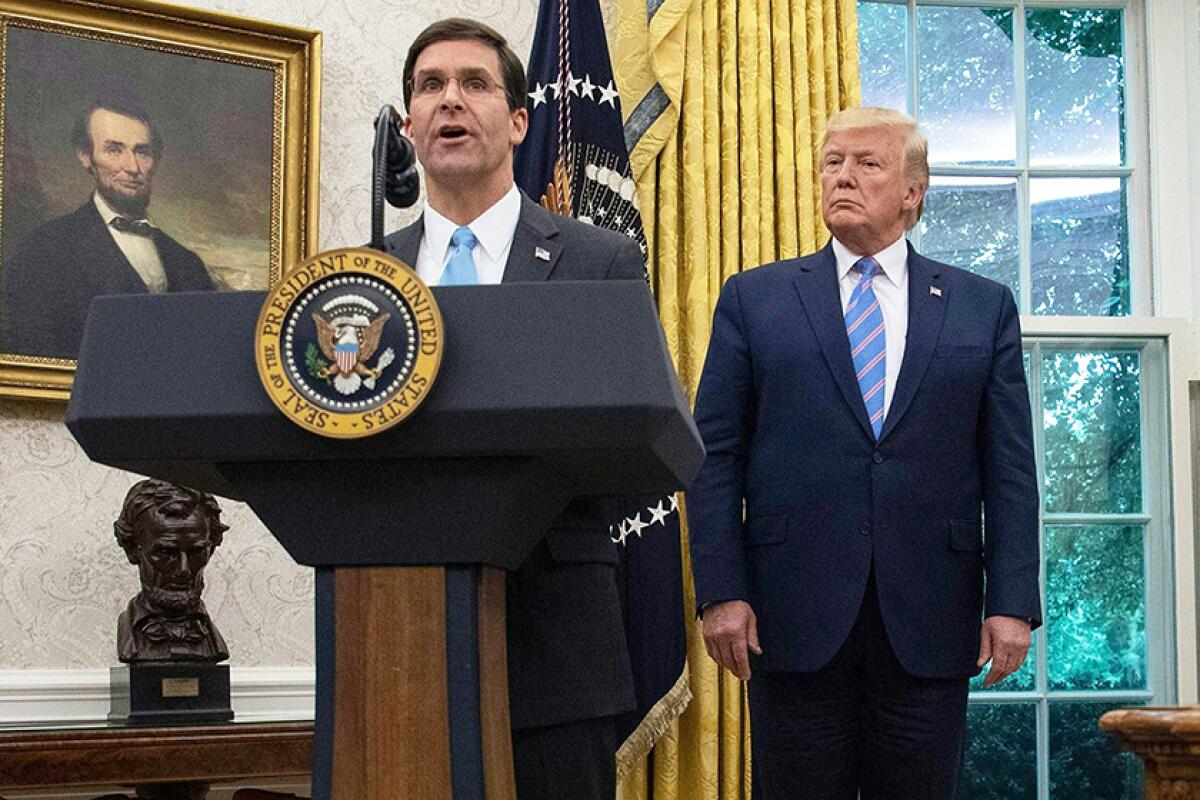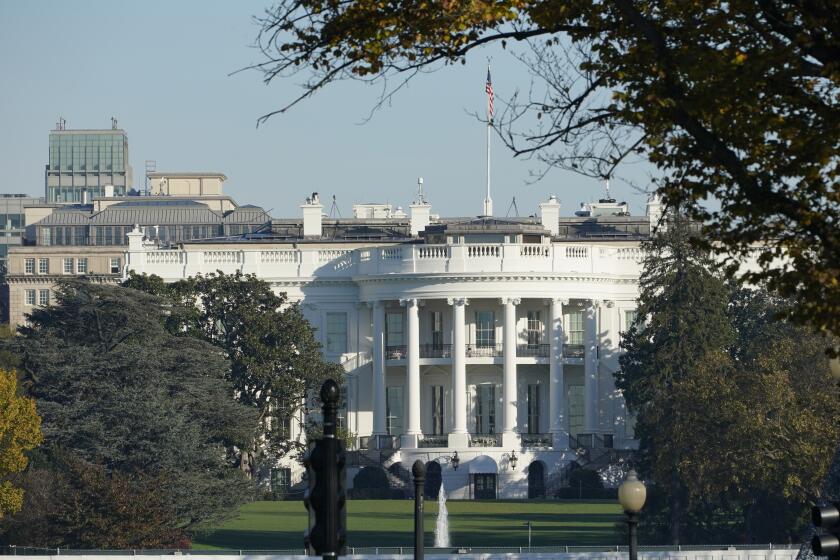Esper’s firing raises concerns about Trump’s plans for the Pentagon in final weeks

- Share via
WASHINGTON — President Trump’s decision to fire Defense Secretary Mark Esper on Monday raised concerns that he may be planning far-reaching military moves in his final weeks in office — and is putting in place new leadership more inclined to go along.
Trump named Christopher Miller, director of the national counterterrorism center, to take over as acting Defense secretary, bypassing the normal practice of having the Pentagon’s No. 2 official take charge temporarily if the top job becomes vacant.
Trump announced the move on Twitter, saying Esper “has been terminated” and that Miller would assume control immediately.
Miller showed up at the Pentagon a little over an hour later. He issued guidance telling the Pentagon’s vast workforce to continue its mission without changes, a Defense Department official said.
The White House long has hinted that Trump was likely to fire several top national security aides after the election. In addition to Esper, he is said to be angry at FBI Director Christopher A. Wray for not investigating his political enemies and at CIA Director Gina Haspel for delaying release of classified documents about the 2016 campaign.
Before the election, Trump publicly raised the possibility that he might pull all remaining U.S. troops — roughly 4,500 — out of Afghanistan by January.
Unwilling to concede defeat, President Trump’s team creates safe space for him while Joe Biden’s transition starts without necessary government assistance.
He also privately raised the possibility of withdrawing the approximately 500 American forces in Somalia, and a further drawdown in Syria.
It’s unclear whether Trump is still weighing such moves. He has long been frustrated at Pentagon resistance to his goals of ending U.S. involvement in long-running overseas wars and may see the next 10 weeks as a last chance to achieve his goal of bringing forces home.
As commander in chief, Trump retains control over military decision-making until President-elect Joe Biden is sworn in at noon Jan. 20.
Democrats, who had praised Esper’s reluctance to use combat troops to quell widespread protests for racial justice last summer, warned that Trump may be seeking a more pliant leader at the Pentagon.
“The abrupt firing of Secretary Esper is disturbing evidence that President Trump is intent on using his final days in office to sow chaos in our American democracy and around the world,” said House Speaker Nancy Pelosi (D-San Francisco).
Former Pentagon officials and Democratic lawmakers also denounced Trump’s decision, arguing that an acting Defense secretary from outside the Defense Department could face a steep learning curve and a myriad of complex decisions if a national security crisis erupts.
“Firing the Secretary of Defense in the waning weeks of the administration undermines national security at a critical moment,” said Sen. Jack Reed of Rhode Island, the top Democrat on the Senate Armed Services Committee and a retired Army officer.
In an interview conducted before his dismissal but published after he was fired Monday, Esper suggested that his successor might be more willing than he was to go along with Trump’s questionable uses of the military.
“Who’s going to come in behind me?” Esper told Military Times, which covers the armed forces. “It’s going to be a real ‘yes man.’ And then God help us.”
Concerned that the abrupt change in Pentagon leadership might alarm allies and embolden adversaries, Gen. Mark Milley, chairman of the Joint Chiefs of Staff, called senior military counterparts overseas Monday to reassure them that U.S. armed forces remain “ready” and were unaffected by the turmoil in Washington, according to a U.S. official, who spoke on condition of anonymity.
Lawrence Korb, a former senior Pentagon official, said Trump’s decision to appoint Miller, and bypass Deputy Defense Secretary David L. Norquist, sent a troubling signal.
“The message it sends around the world is that Trump is going to continue his disruptive policies for the rest of his time in office. And usually in these cases, you at least let the No. 2 person take charge — you don’t bring someone in from another agency,” Korb said.
“Is the replacement up for the job? Does he have credibility with the military services? We just don’t know,” he added.
Miller is a former midlevel special operations officer who fought in Afghanistan and Iraq before retiring from the military in 2014. He later served in the Pentagon as deputy assistant secretary for special operations before Trump appointed him to take over the counterterrorism center, an arm of the intelligence community.
In appointing Miller, Trump appeared to rely on an ambiguity in federal law about whether the statute governing the filling of vacancies applies to the Defense Department.
The statute allows the president to appoint acting officials to Cabinet positions as long as the individual already serves in a job that requires Senate confirmation. The Senate confirmed Miller on a voice vote in August to head the counterterrorism center, ostensibly making him eligible to take over as acting secretary at a separate agency.
As Biden leads Trump in Georgia, Republicans in the secretary of state’s office rebut accusations of fraud from their political bedfellows.
Steve Vladeck, a University of the Texas law professor, noted that a separate law specifies that the deputy secretary of Defense “shall act for, and exercise the powers of, the Secretary when the Secretary dies, resigns, or is otherwise unable to perform the functions and duties of the office.”
It isn’t clear if that statute applies in this case, Vladeck said in a tweet.
“There’s currently a Senate-confirmed deputy secretary of Defense — David Norquist,” said Vladeck. “He is supposed to become acting Secretary in the event of a vacancy” unless the law is superseded by other federal vacancy statutes. In that case, he said, “Miller is a valid choice.”
Another possible barrier to Miller’s appointment is a law that prohibits anyone who has served as an officer in a regular branch of the armed services in the past seven years from becoming Defense secretary.
Miller left the Army in 2014, but it’s not clear if the restriction applies. Legal experts said the statute does not distinguish between appointments as acting and permanent secretary. The law can be waived but only by the Senate.
More to Read
Get the L.A. Times Politics newsletter
Deeply reported insights into legislation, politics and policy from Sacramento, Washington and beyond. In your inbox twice per week.
You may occasionally receive promotional content from the Los Angeles Times.













